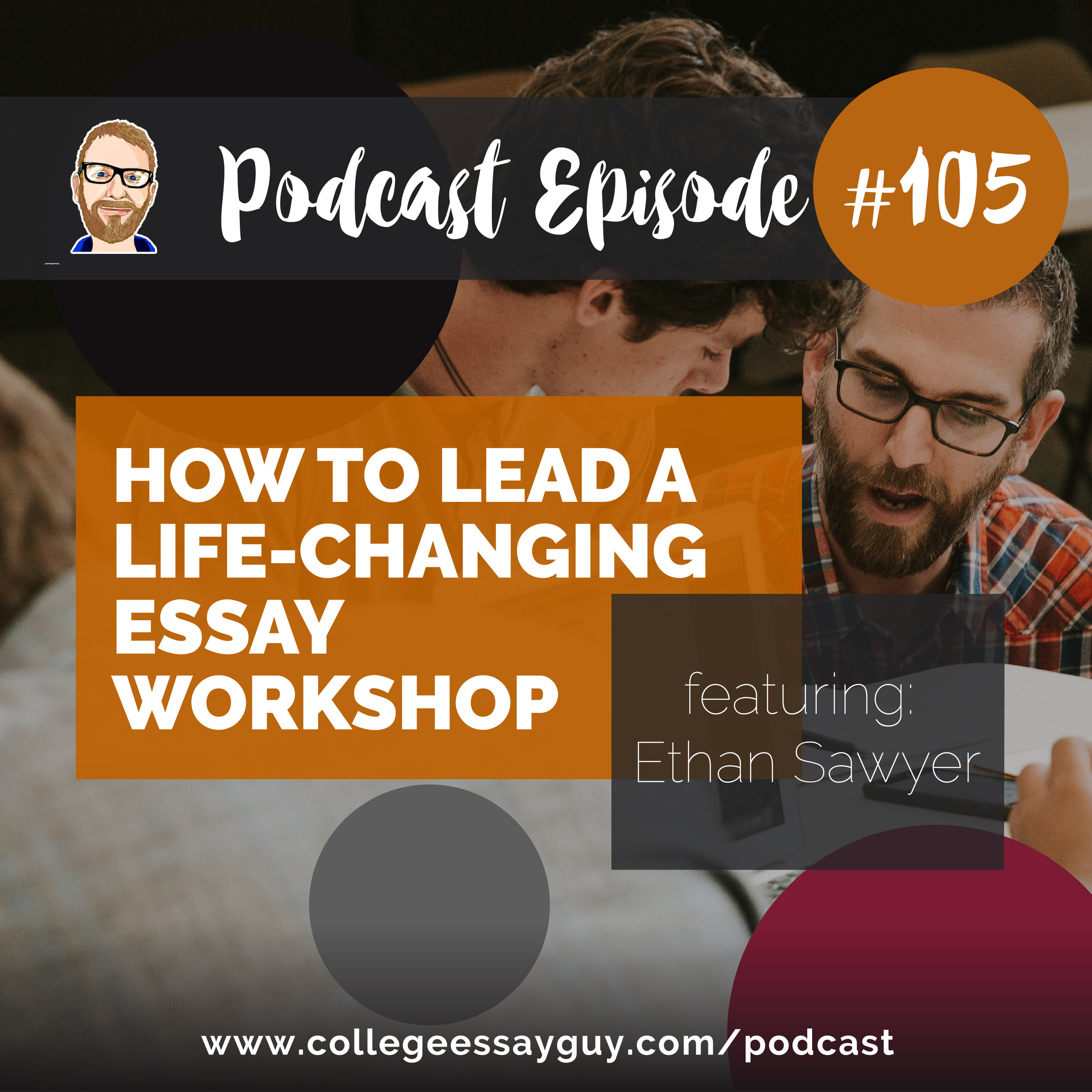SHOW NOTES
Usually on the podcast I interview the most brilliant minds in the college admissions world, to analyze their genius, and then break it down for you into a series of practical, actionable steps to help you in the college application process.
But sometimes, especially when I see that a resource isn’t already out there, I’ll go ahead and create it myself--and that’s what I’ve done in this case with the college essay workshop. Allow me to explain:
Over the past ten years I’ve delivered hundreds of personal statement workshops--some as small as 4 and some as large as 800--and earlier this year I was getting a bunch of workshop requests and thinking: I can’t deliver all these--in large part because I like spending time with my wife and baby. But you know what I could do, I thought? Leverage one of students’ greatest resources--their counselor (and if you’re a counselor listening, that’s you)--and all they’d need in some cases is a few tools to help guide their students through the process. So I spent the past few months creating something called the Essay Workshop in a Box that basically walks counselors step-by-step through how to deliver a great workshop--and I found a way to do it that would bring no cost to their students. That’s right: free-ninety-nine.
So the podcast episode you’re is a webinar that I gave to counselors called “How to Lead a Life-Changing Essay Workshop” and I share three parts of this Essay Workshop in a Box, including:
6 Ways That Most Workshops Fail in the First Five Minutes (aka 6 Terrible Ways to Start a Workshop)
5 Potentially Life-Changing Workshop Moments
Bee tea dubs: These are essentially three of the modules from the Essay Workshop in a Box--there are 29 total, btw, and you can find out more about that in the show notes.
At the end I also say a few words about my Counselor Training Program, which I’m super duper excited about.
Thanks for listening to the podcast and, if you aren’t a counselor, don’t worry because the next episode--and all the others!--are for you. Please enjoy this episode… I hope it changes your life.
PLAY-BY-PLAY
What today’s episode is about [0:49]
Including the Counselor Workshop in a Box [1:45]
And the Counselor Training Program [2:30]
What is something that you’d like to be better at being or doing? [3:03]
I spill my guts about what I wants to be better at. [4:117
Second introduction here? [3:53]
You have a mention of the webinar here. [4:36-47]
Six ways facilitators lose their audience in the first five minutes [6:25]
First way to not start a workshop: give out a lot of information [6:30]
Should I start a workshop with an introduction?[7:45]
Third way: don’t start your workshop by talking about breakfast [8:40]
Fourth: don’t start a large workshop by going around the room and sharing names and intentions [9:24]
Fifth: don’t start your introductions with superficial questions [10:35]
Get nametags--skip the name sharing.
Why it’s important to clarify your intentions [11:45]
My counseling intention: to bring more ease, purpose, and joy to the college essay process [12:16]
A list of deep questions to use with students to create content [14:53]
Crappy brainstorming exercises [13:19]
Building rapport is incredibly important for working with students [14:11]
Build rapport by playing the “If you really knew me…” exercise [15:06]
Five potentially life changing moments [19:44]
Students’ lives begin to change in the first five minutes of a workshop [20:03]
Moment two: Amazing Workshop Icebreaker: the “I love” Game [20:15]
What does it mean to change someone’s life? [21:04]
The values exercise [21:52]
My top value for the day: release [23:22]
How to write a narrative essay [23:58]
Setting agreements with your students: no gossip, listen with respect, participate fully, take care of themselves [24:32]
The basic structure of a workshop introduction [25:25]
Feelings and Needs Exercise and why I love them [25:49]
Make sure to take an 8-minute break after a heavy Feelings and Needs Exercise [27:00]
The fourth life-changing workshop moment: ask students to share their stories [27:18]
Make sure that listening students get time to repeat the story they heard back to the storyteller [28:46]
If there’s time, talk about the montage structure [29:18]
Moment five: encourage an open essay-reading time where students can tell their story [29:023]
Ask for feedback from the listeners and storytellers about what it’s like to hear each story told [31:02]
9 tips for leading a workshop of any size [31:55]
Tip 1: make sure that the task you’ve given students is really clear [32:04]
For example: How to create breakout groups for the essence objects exercise [32:56]
Tip 2: specify how long the exercise will last [34:43]
Tip 3: assign a little less time to your students than it will actually take them [35:08]
Or extend the time you give to students for an exercise if they’re working diligently [36:48]
Tip 4: Get support (like a volunteer or other counselor) to help you facilitate the workshop [36:55]
Tip 5: Don’t let “adultism” get in the way of building rapport with students [37:14]
If students are not on task, it might be because the task is not clear to them [37:59]
Tip 6: if students aren’t on task then clarify the task [39:21]
Tip 7: don’t leave the room during paired work [39:31]
Sync up your bathroom and food breaks with your students [40:06]
Encourage students to not check their cell phones during the breaks [40:22]
Consider “productive tangents” as opportunities to workshops student’s stories live or answer important questions [41:08]
When it comes to workshops, “the map is not the territory”. [42:37]
Essay Workshop in a Box [43:29]
Counselor Training Program [44:40]
If the Essay Workshop in a Box is your boat and a map, the Counselor Training Program will teach you to sail [45:06]








